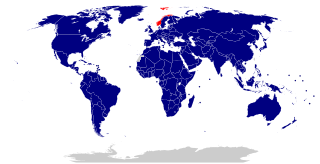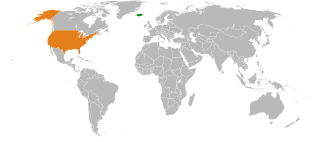Related Research Articles

The foreign relations of Norway are based on the country's membership in NATO and within the workings of the United Nations (UN). Additionally, despite not being a member of the European Union (EU), Norway takes a part in the integration of EU through its membership in the European Economic Area. Norway's foreign ministry includes both the minister of foreign affairs and minister of international development.

Iceland took control of its foreign affairs in 1918 when it became a sovereign country, the Kingdom of Iceland, in a personal union with the King of Denmark. As a fully independent state, Iceland could have joined the League of Nations in 1918, but chose not to do so for cost reasons. It negotiated with Denmark to initially carry out most of its foreign relations, while maintaining full control. Denmark appointed a diplomatic envoy (Ambassador) to Iceland in 1919 and Iceland reciprocated in 1920, opening an Embassy in Copenhagen. Iceland established its own Foreign Service in April 1940 when Denmark became occupied by Nazi Germany and ties between the two countries were severed. The Republic of Iceland was founded in 1944. The Icelandic foreign service grew slowly in the post-WWII period, but increased rapidly after the mid-1990s. Iceland's closest relations are with the Nordic states, the European Union and the United States. Iceland has been a member of the United Nations since 1946. Iceland was a founding member of the World Bank in 1946 and NATO in 1949. In terms of European integration, Iceland was a founding member of the OEEC in 1948 and the Nordic Council in 1952, it joined EFTA in 1970, was a founding member of the CSCE in 1973 and the EEA in 1992 and joined Schengen in 1996.

House of Sweden is a building in Washington, D.C., in which is located the Embassy of Sweden and the diplomatic missions of the Republic of Iceland and the Principality of Liechtenstein to the United States. The building is located at 2900 K Street N.W. in the Georgetown neighborhood.

The United States has maintained diplomatic relations with Iceland since the mid-1800s.

Iceland–India relations refers to the bilateral relations between Iceland and India. Historically, Indo-Icelandic bilateral relations have been friendly but lacked substantive content. Iceland and India established diplomatic relations in 1972. At that time the embassy of Iceland in London, United Kingdom was accredited to India and the embassy of India in Oslo, Norway, was accredited to Iceland. Embassies were established in New Delhi in 2005 and in Reykjavik in 2006.

Iceland–Latvia relations are foreign relations between Iceland and Latvia. Iceland was the first country to recognize the independence of Latvia in August 1991. Both countries re-established diplomatic relations on August 22, 1991. Neither country has a resident ambassador. Iceland is represented in Latvia through its embassy in Helsinki (Finland). Latvia is represented in Iceland through its embassy in Oslo (Norway) and an honorary consulate in Reykjavík.

Denmark – Sri Lanka relations refers to the current and historical relations between Denmark and Sri Lanka. Denmark is represented in Sri Lanka through its embassy in New Delhi, India. Sri Lanka is represented in Denmark through its embassy Oslo, Norway. Bilateral relations are described as warm for a long time. About 13,000 immigrants from Sri Lanka live in Denmark. President of Sri Lanka Chandrika Bandaranaike Kumaratunga visited Denmark in March 1995.

Iceland–North Korea relations refers to the current and historical relationship between Iceland and the Democratic People's Republic of Korea (DPRK), commonly known as North Korea. Neither nation maintains an embassy in their respective capitals. Instead, the Icelandic ambassador in Beijing is also accredited to North Korea, while the North Korean ambassador in Stockholm is accredited to Iceland. The Swedish embassy in Pyongyang handles visa matters on behalf of Iceland.

The Embassy of Sweden in Washington, D.C. is Sweden's diplomatic mission in the United States. The Swedish Embassy in Washington, D.C. is one of Sweden's largest diplomatic missions with more than fifty employees. Ambassador since 2017 is Karin Olofsdotter. Sweden also has a Consulate General in New York City and a number of Honorary Consulates General in the United States. Since 2006, the embassy is located in the House of Sweden building on the Potomac River.
Sigríður Ásdís Snævarr is an Icelandic diplomat and was the first woman to be appointed as an ambassador by Iceland, serving as ambassador to Sweden from 1991 to 1996.
References
- ↑ "New ambassadors to Sweden". Government of Sweden. Retrieved 15 August 2020.